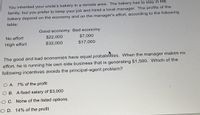
ENGR.ECONOMIC ANALYSIS
14th Edition
ISBN: 9780190931919
Author: NEWNAN
Publisher: Oxford University Press
expand_more
expand_more
format_list_bulleted
Concept explainers
Question
Q25

Transcribed Image Text:You inherited your uncle's bakery in a remote area. The bakery has to stay in the
family, but you prefer to keep your job and hired a local manager. The profits of the
bakery depend on the economy and on the manager's effort, according to the following
table:
Good economy Bad economy
No effort
$22,000
$7,000
High effort
$32,000
$17,000
The good and bad economies have equal probabilities. When the manager makes no
effort, he is running his own side business that is generating $1,500. Which of the
following incentives avoids the principal-agent problem?
O A. 7% of the profit
O B. A fixed salary of $3,000
O C. None of the listed options.
O D. 14% of the profit
Expert Solution
This question has been solved!
Explore an expertly crafted, step-by-step solution for a thorough understanding of key concepts.
Step by stepSolved in 2 steps

Knowledge Booster
Learn more about
Need a deep-dive on the concept behind this application? Look no further. Learn more about this topic, economics and related others by exploring similar questions and additional content below.Similar questions
- James has been working as a Mechanical Engineer ever since he graduated five years ago. Two years ago, he bought and financed a new $25,000 Jeep Compass and still owes $15,750 on his car loan. He has never been late with a car payment. James has one major credit card, with a $1,000 limit. He has had it since his senior year of college and was two months late with a payment one time during that first year. He is currently carrying a balance of $600 on this card. In the last year, James applied for six store credit cards at places that he shops a lot so that he can earn points and get discounts. He carries no balances Part 1: Calculate James’ credit score. Recalculate his credit score if he had not opened the six store credit cards. Part 2: James is tired of paying rent and would like to purchase a condo so that he can start building equity in his home. He is looking for a 30-year mortgage to purchase a $240,000 condo. What interest rate does James qualify for on a mortgage with his…arrow_forwardDiane initially deposited $11,000 into a money market account and made no additional deposits or withdrawals. When she closed the account in exactly one year, its value had grown to $11,125. Calculate the annual growth rate for the money market account. Round your answer to two places after the decimal. %arrow_forwardSusan has a choice between two perpetuities payable at the beginning of every month. The first pays $100 today and increases by 1% every month. The second pays $100 today and increases by $X every month. These two annuities are equally valuable at i= 20%. Find X.arrow_forward
- What is the Times-Interest-Earned Ratio?arrow_forwardPlease assist if possible.arrow_forwardDana was dating Wade, a wealthy real estate entrepreneur. Wade was much older than Dana and knew he needed to offer something “special” to make her stay. Wade told Dana that if she continued dating him, he would pay her $10,000 a month. Wade paid Dana for two years when suddenly, for no apparent reason, he stopped the monthly payments. Dana stayed with Wade for another six months, but decided enough was enough and left. She wanted the $60,000 she was owed for the six months; Wade refused to pay her. Is Dana entitled to the $60,000?arrow_forward
- What equation can determine whether a cryptocurrency is significantly overvalued?arrow_forward08arrow_forwardDiane initially deposited $10,500 into a money market account and made no additional deposits or withdrawals. When she closed the account in exactly one year, its value had grown to $10,900. Calculate the annual growth rate for the money market account. Round your answer to two places after the decimal.arrow_forward
arrow_back_ios
arrow_forward_ios
Recommended textbooks for you

 Principles of Economics (12th Edition)EconomicsISBN:9780134078779Author:Karl E. Case, Ray C. Fair, Sharon E. OsterPublisher:PEARSON
Principles of Economics (12th Edition)EconomicsISBN:9780134078779Author:Karl E. Case, Ray C. Fair, Sharon E. OsterPublisher:PEARSON Engineering Economy (17th Edition)EconomicsISBN:9780134870069Author:William G. Sullivan, Elin M. Wicks, C. Patrick KoellingPublisher:PEARSON
Engineering Economy (17th Edition)EconomicsISBN:9780134870069Author:William G. Sullivan, Elin M. Wicks, C. Patrick KoellingPublisher:PEARSON Principles of Economics (MindTap Course List)EconomicsISBN:9781305585126Author:N. Gregory MankiwPublisher:Cengage Learning
Principles of Economics (MindTap Course List)EconomicsISBN:9781305585126Author:N. Gregory MankiwPublisher:Cengage Learning Managerial Economics: A Problem Solving ApproachEconomicsISBN:9781337106665Author:Luke M. Froeb, Brian T. McCann, Michael R. Ward, Mike ShorPublisher:Cengage Learning
Managerial Economics: A Problem Solving ApproachEconomicsISBN:9781337106665Author:Luke M. Froeb, Brian T. McCann, Michael R. Ward, Mike ShorPublisher:Cengage Learning Managerial Economics & Business Strategy (Mcgraw-...EconomicsISBN:9781259290619Author:Michael Baye, Jeff PrincePublisher:McGraw-Hill Education
Managerial Economics & Business Strategy (Mcgraw-...EconomicsISBN:9781259290619Author:Michael Baye, Jeff PrincePublisher:McGraw-Hill Education


Principles of Economics (12th Edition)
Economics
ISBN:9780134078779
Author:Karl E. Case, Ray C. Fair, Sharon E. Oster
Publisher:PEARSON

Engineering Economy (17th Edition)
Economics
ISBN:9780134870069
Author:William G. Sullivan, Elin M. Wicks, C. Patrick Koelling
Publisher:PEARSON

Principles of Economics (MindTap Course List)
Economics
ISBN:9781305585126
Author:N. Gregory Mankiw
Publisher:Cengage Learning

Managerial Economics: A Problem Solving Approach
Economics
ISBN:9781337106665
Author:Luke M. Froeb, Brian T. McCann, Michael R. Ward, Mike Shor
Publisher:Cengage Learning

Managerial Economics & Business Strategy (Mcgraw-...
Economics
ISBN:9781259290619
Author:Michael Baye, Jeff Prince
Publisher:McGraw-Hill Education